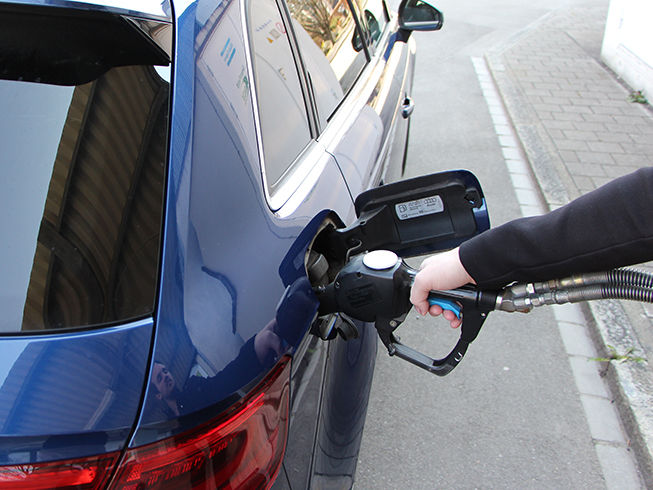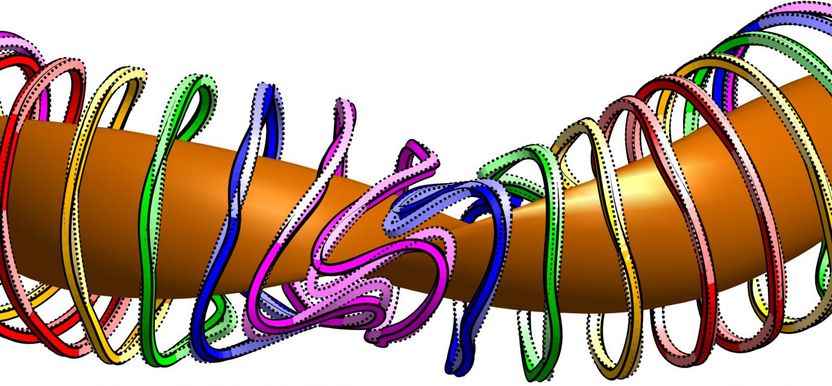Synthetic gas instead of fossil energy
Advertisement
There is one major challenge in converting our energy system to purely renewable energy sources: winter – or rather the supply gap at this time. The conversion of surplus summer electricity into synthetic gas offers a way of ensuring that renewable energy could be available in sufficient quantities during the winter months. It would also allow to operate long-distance trucks. The Canton of Zurich has great interest in replacing fossil fuels with Renewable energies and is, therefore, providing financial support for the Empa's "Power-to-gas" project.

Refuelling of a gas vehicle at the "move" future mobility demonstrator at Empa.
Empa
The call to abandon fossil fuels altogether is becoming ever louder, not just in Switzerland but also in the EU and numerous other countries. While a number of projects trying to implement this shift in our energy systems are already underway or in planning in many sectors, there are challenges, for which clear and practicable solutions are still lacking. One of these is to supply Switzerland with renewable energy in wintertime; another one is to convert long-distance, heavy and air traffic to renewable fuels. An ongiong research project at Empa is looking into the production of synthetic methane. The Canton of Zurich is now supporting the project with a total of CHF 500,000 from the framework credit to support pilot projects in the energy sector.
Using existing transport systems
Synthetic methane can be produced from renewable electricity and carbon dioxide (CO2) and easily transported via the gas grid. The infrastructure is thus in place, as are trading mechanisms, standards and expertise. This makes it one of the few options for supplying Switzerland with renewable energy during winter. Synthetic methane can also be used in liquid form as an alternative to diesel for long-distance cargo transport, and it enables the electricity, heating and transport sectors to be linked. Research into the production of synthetic methane also serves as a basis for the development of synthetic kerosene, which should enable CO2-neutral air travel in the future.
"It is a key question for protecting our climate: How can we make surplus solar energy from summertime available all year round in order to become CO2-free – especially in transport," says Martin Neukom, Head of the Building Department of the Canton of Zurich. Although the conversion of renewable electricity into synthetic methane is not new, various fundamentals are still missing for the classification and comparative evaluation of future energy supply and mobility concepts.
Brigitte Buchmann, member of Empa's Board of Directors and strategic project leader, stresses that developing reliable energy-related and economic data is, therefore, a main focus of the project. "The project consortium consists of partners covering the entire value chain, i.e. from Empa researchers to energy suppliers, fueling station and fleet operators all the way to industrial partners in the technology sector."
Empa fueling station with synthetic methane
The goal of the project is to expand "move" – Empa's future mobility demonstrator, where various electric and hydrogen mobility projects are already underway – to include a production facility for synthetic methane by 2021. At the connected fueling station, trucks provided by a project partner can be refuelled with CO2-neutral, synthetic methane. A process developed at Empa will be used to produce this methane. In parallel, the researchers will investigate cost structures and develop economic models, which can serve as a basis for decision makers to shape the framework conditions for future post-fossil mobility.
The project consortium is thus supporting efforts to gradually replace fossil fuels with sustainably produced renewable energy carriers. The financial commitment of the Canton of Zurich and various industrial partners shows that there is great interest in such solutions.































































